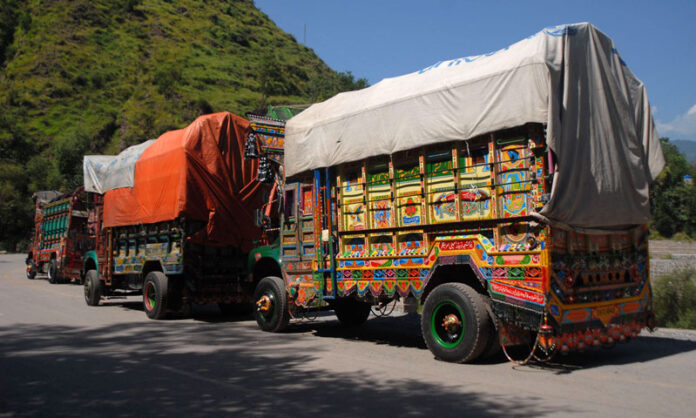The Karachi Chamber of Commerce and Industry (KCCI), backed by goods transport associations from across the country, has announced a nationwide wheel-jam strike on July 19 in protest against the Finance Act 2025, warning that all economic activity could grind to a halt if the federal government does not immediately suspend the newly introduced fiscal provisions.
Speaking at a press conference on Monday at KCCI headquarters, President Muhammad Jawed Bilwani firmly rejected what he called five major measures and 32 anomalies contained in the Finance Act. He demanded that the federal government issue an official notification suspending these provisions as a precondition for any future dialogue.
“The entire business and transport community stands united,” Bilwani said, flanked by goods transport leaders from Karachi, Lahore, and other cities. “No vehicle will move on July 19. This is not just a strike—it’s a call for economic survival.”
Among the measures KCCI wants withdrawn are Sections 37A and 37B of the Sales Tax Act, which allow FBR officials to arrest individuals without a warrant; Section 21(S), which imposes penalties on cash transactions of Rs200,000 or more; SRO 709, which mandates digital invoicing; Section 40C concerning e-Bilty regulations; and the reversal of changes to the Final Tax Regime for exporters.
Bilwani confirmed that the Ministry of Finance had reached out to KCCI for discussions but said no written assurance or formal notification had been provided to date.
“We have made it clear; unless these provisions are formally held in abeyance, there will be no dialogue and no postponement of the strike,” he stressed.
Representatives of the Pakistan Goods Transport Alliance and other transport associations expressed complete solidarity with KCCI and confirmed that all goods movement across the country will be suspended on the day of the strike.
Chairman of the Businessmen Group (BMG) Zubair Motiwala, who was also present, remarked: “Strikes are not our preference, but the government’s indifference has left us with no choice. This is now a question of economic survival.”
Responding to a question on national coordination, Bilwani stated that more than 50 trade and industrial associations from across Pakistan have formally endorsed KCCI’s stance. He also criticized the Federal Board of Revenue’s enforcement record and called for transparency and accountability within the Finance Ministry.
“The country cannot afford these anti-business policies. We urge the government to act before the damage becomes irreversible,” he concluded.
With both the business and transport sectors aligned, the strike is expected to disrupt supply chains and commercial operations across Pakistan.
Separately, the Lahore Chamber of Commerce and Industry (LCCI) also announced a countrywide strike on July 19. LCCI’s protest targets Section 37AA of the Income Tax Ordinance, taxes on bank transactions, and Punjab’s proposed labour policy, which it has described as “anti-business.”
Speaking at a press conference in Lahore, LCCI President Mian Abuzar Shad warned that the new fiscal policies would severely impact business activity, increase unemployment, and deter investment.
He condemned the broad powers granted to FBR officials and criticised the government for bypassing stakeholder consultations in economic policymaking.
The LCCI called for the immediate withdrawal of these provisions and an end to what it termed “economic victimisation” of the business community.
With growing support from chambers and trade bodies nationwide, the July 19 strike is shaping up to be one of the most significant protests by the private sector in recent years.




